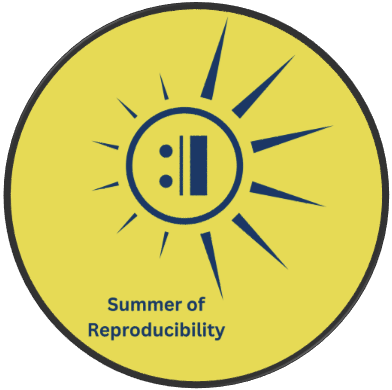Matching reproducibility researchers with summer students and sponsors

The Summer of Reproducibility (SoR) is a program focused on research projects to produce and use reproducibility artifacts (see also ctuning.org and sysartifacts).
See our SoR Project Archive for a complete listing of completed SoR projects.
Contents
Important Links
- List of Available Projects for SoR’25 | How to Apply
- General Information for SoR Mentors
- General Information for SoR Students
- 2025 Timeline
SoR Overview
Quite a few conferences are now offering awards for reproducibility artifacts. This encourages authors to produce reproducibility artifacts. There is great potential for using these artifacts not only for validating research results but also as teaching tools in classrooms and as baselines in research labs. Simplifying the process of producing and using reproducibility artifacts can significantly accelerate the rate of insights. The Summer of Reproducibility allows summer students to help out in this cutting-edge effort and acquire valuable skills related to reproducibility. The Summer of Reproducibility (SoR) is a collaboration between the Open Source Research Experience (OSRE) organized by the OSPO UC Santa Cruz and the REPETO project. SoR provides support for undergraduate and graduate students contributing to open-source research efforts. The goal of the program is to help make computational research efforts reproducible. REPETO is funded by the NSF FAIROS RCN program and is a collaboration of Kate Keahey, U Chicago (lead PI), Haryadi Gunawi, U Chicago (co-PI), Cormac Flanagan (PI) and Stephanie Lieggi (co-PI), UC Santa Cruz, and Fraida Fund, NYU Tandon (PI).
The Summer of Reproducibility empowers students to work on open-source projects that make research experiments replicable and reusable. Since its 2023 launch, the program has supported over 40 students and 50 mentors across disciplines like machine learning, genomics, and networking. Mentors—researchers, faculty, or industry professionals—propose projects that teach reproducibility best practices, streamline artifact creation, or integrate replicable experiments into education.
Selected students (SoR Fellows) receive stipends to collaborate with mentors over the summer, gaining hands-on experience while contributing to the reproducibility movement.
Submitting a Project Idea for SoR
If you are interested in being a SoR mentor the first step is to create “project ideas” (see instructions for submitting project ideas) for students to base their proposals around. A project idea is a brief overview of the activity/task a student would work on over the summer.
Accepted project ideas are compiled and published on the OSRE 2025 webpage (select the #reproducibility tag to filter) for students to browse; interested students then reach out to mentors as they build their SoR project proposal. SoR mentors are typically researchers or faculty from any university or organization looking to support the development and use of reproducibility artifacts. If you have questions about being a mentor or about project requirements, check out the mentor information video, the Mentor FAQ, or contact the SoR administrators directly (ospo-info-group@ucsc.edu).
How to Structure an SoR Project
The SoR program supports projects that focus on developing and using reproducible artifacts for Computer Science research. Project ideas for the SoR program should steer students towards producing reproducibility artifacts for use by others and/or using artifacts to validate research results, evaluate/develop teaching tools for classrooms, and extend research insights. See the SoR program page to read more about these objectives.
We do not require that SoR projects use any particular technology or platform. However, we encourage mentors to design projects that leverage public infrastructure and open-source platforms (such as Chameleon Cloud and CloudLab) to exploit the availability of shared resources, which can lead to more robust reproducibility artifacts and usage. For example, Chameleon enhances experiment reproducibility by offering shared access to uniform hardware resources and enabling users to configure, deploy, and share experimental environments (with the Trovi service) through cloud-based tools. Additionally, Chameleon’s Jupyter Notebook integration supports the implementation, analysis, and visualization of experiments within a cohesive environment, significantly facilitating the packaging of experiments for repeatability and further research collaboration.
Latest News on SoR
Summer of Reproducibility 2025 – Call for Projects
2024 Summer of Reproducibility – Another Great Year Promoting Practical Reproducibility
Summer of Reproducibility 2024 Is Coming!
